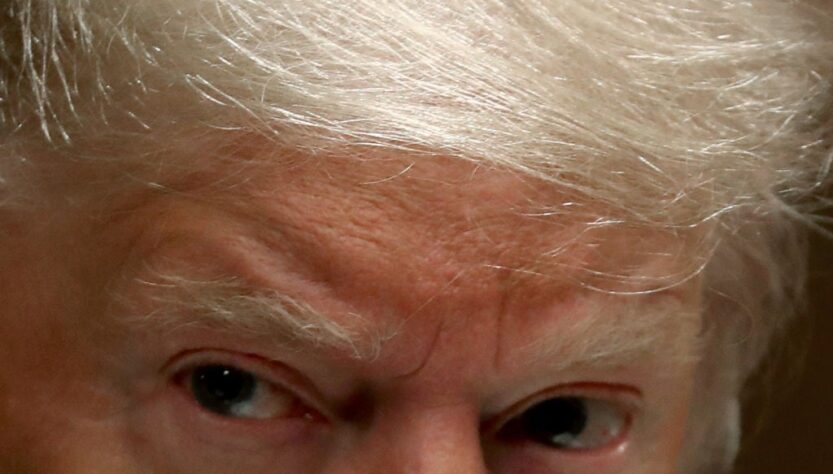
(Photo by Mark Wilson/Getty Images)
There’s a reason Donald Trump has a parking garage lawyer on an existential case for his business empire. The former president is infamous for stiffing his lawyers and, at this point, proximity to his brand is downright toxic for the sort of corporate clients that fill a firm’s coffers. That’s why Biglaw partners hoping to represent Trump end up leaving their firms because the rest of the partnership, for some reason, sees little value in attracting a lot of negative press, scorching more lucrative business relationships, and eventually not getting paid.
Which makes this nugget from the District of Massachusetts docket (1:23-CV-12121-MJJ) all the more interesting because it seems as though Nixon Peabody has gone where other Biglaw firms fear to tread and thrown the firm’s lot in with Donald Trump.
Does he think the fact that everyone’s a winner at Nixon Peabody bolsters his claim that he won the election?
Castro v. Galvin, technically versus Secretary of State Galvin and Donald Trump, is the Massachusetts version of the popular yet ultimately doomed liberal theory that the Fourteenth Amendment’s ban on insurrectionists holding federal offices should exclude Trump from appearing on the ballot. Appearing on behalf of Trump, Nixon Peabody partner Brian T. Kelly moved to dismiss the case.
There are good reasons why this argument fails. And then there are incredibly stupid reasons. Former US Attorney General Michael Mukasey who has spent the last 20 years staking out increasingly embarrassing public legal takes like his law degree owed him money, argued that the President can’t be “an officer” of the United States. Does the Constitution refer to the President as “an officer” of the United States? Yes. NINE FUCKING TIMES, in fact.
On the other hand, it’s unclear who gets to act upon that prohibition. Amendments aren’t necessarily self-executing and while its text might prove an actually valid reason for a future legislature to reject Electoral votes, it’s unlikely to give any individual citizen an avenue to keep someone off the ballot via lawsuit.
The Nixon Peabody motion takes a kitchen sink approach, offering both the good arguments and the silly one championed by Mukasey. Offering technical, lawyerball defenses of the former president still amounts to a terrible business decision for a firm, but it’s at least spinnable. “Look, we don’t endorse what he did, but we’re ‘standing up for standing’” is a message you can sell to nervous clients. It’s not like the brief tries to downplay January 6 or anyth… oh wait:
So “insurrection,” as understood at the time of the passage of the Fourteenth Amendment, meant the taking up of arms and waging war upon the United States. At the time of Section Three’s enactment, the United States had undergone a horrific civil war in which over 600,000 combatants died, and the very survival of the nation was in doubt. As shown by the omission of the word “incitement” in Section Three, Congress did not intend that provision to encompass those who merely encouraged an insurrection, but instead limited its breadth to those who actively participated in one.
This is asinine. Yes, everyone alive in years following the Civil War thought of it as an insurrection, but that does not mean the public was obtuse enough to think the Civil War was the only insurrection that could ever exist. If one wanted to be needlessly textual, you could say the Fourteenth Amendment could’ve sought to disqualify “participants in the just concluded war between the states” but they didn’t because they fully understood the law to encompass future efforts to subvert the government. The brief also features a digression into how Brandenburg should govern the interpretation of the Fourteenth Amendment. In total, almost a third of the brief is spent blowing off January 6 or Trump’s role in it.
Just the sort of arguments that Fortune 500 companies love to see their law firms making!
Rumblings suggest that there are Nixon Peabody partners already calling for Kelly to step down over the matter to shield their books of business from the taint of Trump. Because obviously.
How does something like this happen? I guess he did pardon one of their old partners… maybe they felt they owed him?
An unconfirmed report claims that this matter skirted the firm’s established incoming client procedure that would have undoubtedly put a stop to it before it hit the papers. In any event, one has to wonder where managing partner Stephen D. Zubiago was in all this. Even if Zubiago had no prior knowledge of the representation, he knows about it now and the fact that this got filed with Nixon Peabody’s name all over it amounts to a severe business risk that someone should’ve been on top of. One tipster informed us that “no confidence” conversations have already begun among the partnership over this affair.
It doesn’t sound like everyone’s winning over there right now.
 Joe Patrice is a senior editor at Above the Law and co-host of Thinking Like A Lawyer. Feel free to email any tips, questions, or comments. Follow him on Twitter if you’re interested in law, politics, and a healthy dose of college sports news. Joe also serves as a Managing Director at RPN Executive Search.
Joe Patrice is a senior editor at Above the Law and co-host of Thinking Like A Lawyer. Feel free to email any tips, questions, or comments. Follow him on Twitter if you’re interested in law, politics, and a healthy dose of college sports news. Joe also serves as a Managing Director at RPN Executive Search.

